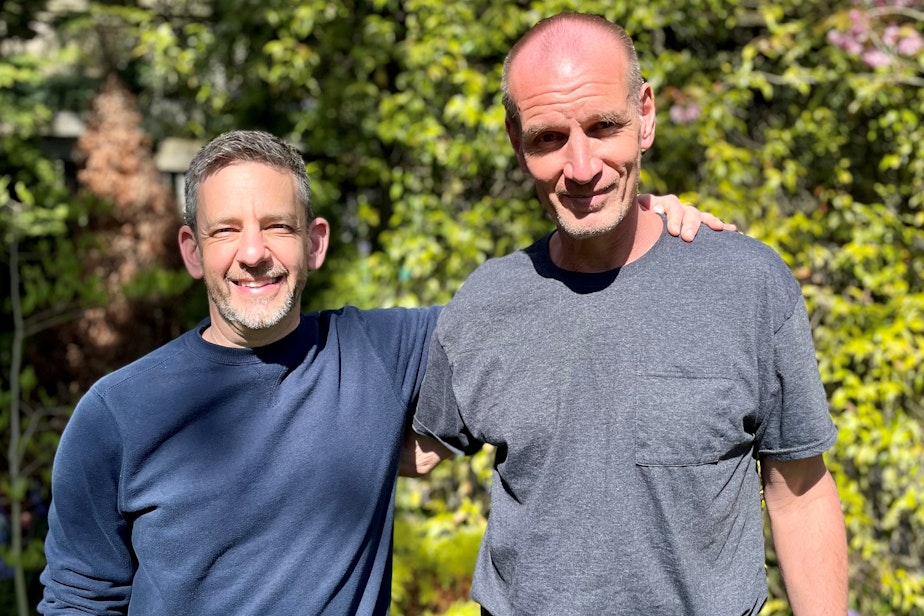'I was raised to be an animal, and that's what happened.' Arthur Longworth's long, troubling path toward redemption

Arthur Longworth was released from the Washington State Penitentiary earlier this month. He served 37 years for the murder of Cynthia Nelson in a Seattle robbery in 1985. Longworth, now 57 years old, is a former foster youth.
Journalist Claudia Rowe wrote about Arthur Longworth recently for Crosscut. She talked to KUOW’s Kim Malcolm about how his story offers a glimpse into the connection between incarceration and the foster care system.
This interview has been edited for clarity.
Kim Malcolm: Let's start at the beginning. What happened to Arthur Longworth as a child?
Claudia Rowe: Arthur was raised in a family that he began running away from pretty early in life, feeling that discipline there was extreme. He was running away as a very young kid, maybe 11 or 12. At that point, he was taken into foster care at about age 13. In one of the group homes, at least one of them, there was severe abuse.
He left foster care at 16 years of age. What happened after that?
At this point, he had been in 14 placements and he was just done. The state, incredibly, said, "Arthur Longworth refused further services and informally emancipated himself," and that's that. He was 16 years old. He had no family to turn to. He had virtually no education, and he was on the street.
Sponsored
And things got a lot worse pretty quickly after that, right?
Things got a lot worse. He really had no place to stay. He began burglarizing homes to eat. That escalated to armed robbery, and finally to Cindy Nelson who he killed during what was, I believe, intended to be a robbery initially.
And he ended up in prison for that crime.
He was charged with aggravated first-degree murder, and he got a life sentence for that crime.
You're writing a book about the connections between foster care and prison. Can you tell us about how Arthur Longworth’s case fits into the research you're doing?
Sponsored
There's an enormous amount of realization these days, an appreciation for the unbelievable rates of incarceration among young people, either while they're in foster care or immediately afterwards. That could include juvenile detention, as well as jail or prison.
There's a great deal of effort being devoted to trying to determine the causality. Is it something about whatever treatment brought the young person into foster care to begin with that is then untreated in foster care? That surely is part of it. But is it also something about foster care itself, and the way that system is structured?
Do you have any figures about how prevalent it is in Washington state, or what the connections are between youth who used to be in foster care and are currently in prison for violent crimes?
What I do know is that in our youth prison system there is information to suggest that 80% of the young people in our facilities have had some kind of involvement with the child welfare system. Those are young people who are en route to state prison, in many cases.
You write that Arthur Longworth’s early time spent in prison was pretty volatile. He had long periods in solitary confinement, but then at some point, he turned a corner. What happened?
Sponsored
He had an enormous number of infractions early on, but then he sort of woke up. He realized how many of the inmates around him were also so-called alumni of foster care. He began to connect the dots. He himself was extremely angry. He says in the story, ‘I was raised to be an animal, and that's what happened.’ He felt that foster care had sort of molded him to be without empathy, without appreciation for effects on other people, and his own control over himself. To then be punished by the very system that he felt created him sort of generated this appreciation for a cycle in him.
What did he come to understand about his killing of Cindy Nelson? Was he remorseful?
He was very remorseful in this most recent court proceeding. The point he was trying to make, I believe, in arguing for release, was that the system formed him into the person who killed Cindy Nelson and that if he could speak to that connection more broadly, and help change the system that formed him, that would be a way of atoning, so that other young people coming up might not do the same thing.
I'm wondering what Cindy Nelson's family has said, if anything, about his release.
Thank you for asking. Cindy Nelson's family spoke at Arthur's re-sentencing and they were not in favor of it. They have undergone an enormous amount of suffering. Her sister expressed that Cindy had been killed at 25, so young that she really didn't have a chance to do all the things Arthur Longworth has been able to do while in prison. I think that is an enormous wound for her family that doesn't seem to heal.
Sponsored
And what does Arthur Longworth plan to do with his life now?
He's pretty focused on working in whatever way he can with the system from outside of it. I think his real focus is to work with young people who are sort of teetering on that edge where he was. Certainly, I should say, Washington state has gone to some lengths to improve the system since the 1980s when Arthur Longworth was in it. There have been efforts to address these factors, but it's still happening. There are still a lot of kids coming out of foster care who are ending up locked up.
Listen to the interview by clicking the play button above.





